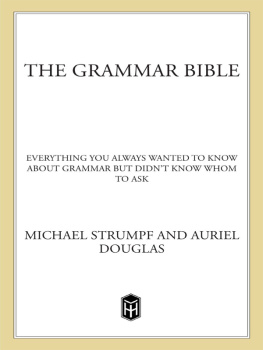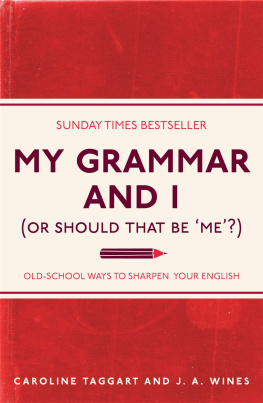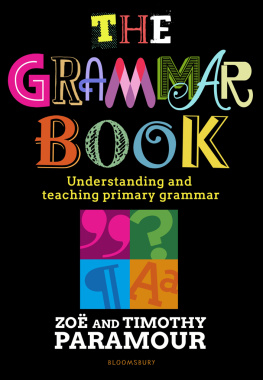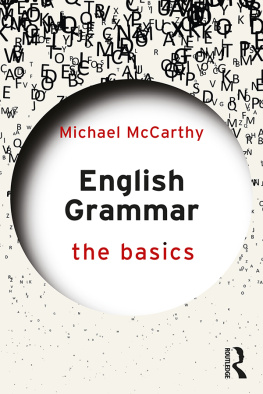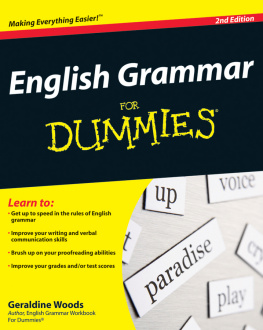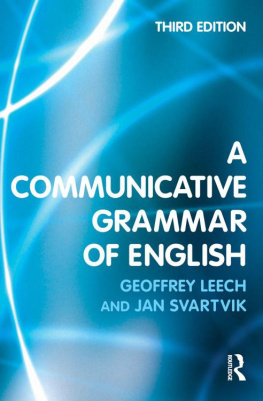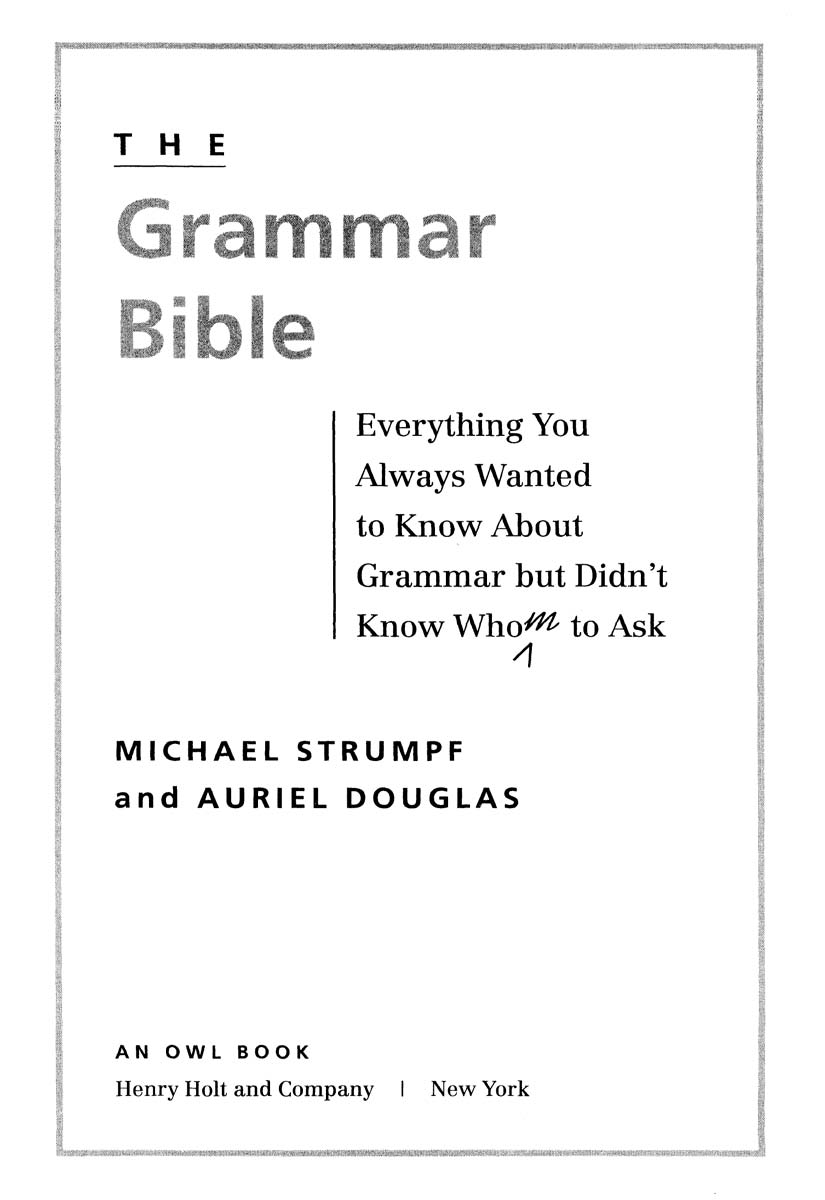
For Patsy, my lovely wife,
and her amazing Spanglish
Michael Strumpf
For Heather and Russell Douglas
and Dariel Walsh
Auriel Douglas
If I had my choice of weapons with you, sir,
Id choose grammar !
Lady for a Day (1933)
I know you believe you understand what you think
I said, but I am not sure you realize that what you heard
is not what I meant.
Anonymous
Contents
Preface
Communication is the essence of the human experience. Despite the ease with which the average person thinks, speaks, and writes complicated ideas on a daily basis, the process of communication is extraordinarily complex, and the distinctly human ability to weave sounds, gestures, and expressions into meaningful units that communicate our thoughts and feelings to our fellow humans is at least worthy of note, if not awe and admiration.
Why then, if the process is so complex, are humans able to communicate so easily and effortlessly? The complete answer to that question is quite beyond the scope of this book and even beyond the limits of modern science. A topic that is within our grasp and the one that this book will tackle is the regular system of rules that we use to weave sounds into the meaningful units with which we express our thoughts and ideas, creating language. We call this system grammar.
In a simple sense, grammar is the study of words and the ways words work together. It is a sort of invisible hand that guides us as we put words together into sentences. Any person who is able to communicate using a particular language has knowledge of the grammar of that language, even if his or her knowledge is unconscious. Grammar is pervasive.
We study grammar so that we may speak and write in a clearer and more effective manner. The unconscious knowledge of grammar that every communicator possesses may be sufficient for simple language use, but those who wish to communicate artfully and well will seek the greater depth of understanding and proficiency that the study of grammar provides.
For over twenty-five years, Moorpark College in Moorpark, California, sponsored The National Grammar Hot Line to aid students of English grammar in their quest for knowledge. The service was free. During the Hot Lines existence, thousands of callers telephoned with questions about the English language and its use. For more than a quarter of a century, I, Michael Strumpf, as an English teacher at Moorpark College, fielded questions from congressmen, governors, ambassadors, editors, writers, teachers, attorneys, students, copywriters, journalists, housewives, secretaries, vice presidents, and, yes, even calls from the White House. People from just about any occupation and walk of life called to ask a question that puzzled or stumped them:
Where do I put this comma?
What case should this pronoun be in?
How do I form the possessive of Dickens?
This book combines the most insightful and revealing of the calls to The National Grammar Hot Line with a scholarly discussion of grammar. We begin with the parts of speech in the first third of the book, move on to the creation of sentences in the second third, and end with a discussion of spelling, vocabulary, and punctuation in the final third. In each chapter, you will find a discussion of a particular topic in grammar, interspersed with Hot Line questions and answers that I feel will strengthen your understanding of the topic. Though The Grammar Bible is a reference book, it has, I hope, been written with a sense of style and a sense of humor. Grammar should be a topic that you enjoy as well as one that you understand.
Happy learning!
Part I
The Parts of Speech

Nouns
Nouns are naming words. They name people, places, things, and ideas.
Imagine a world without names. Imagine, for a moment, the horror and absurdity of ordering a simple meal without naming words. Ill take one of those things with the two soft, round things on the outside and one of those brown mushy things on the inside, and its got some red stuff and some yellow stuff and some round, green things on it. Oh, you must mean a hamburger! You see, I couldnt even get through this ridiculous scenario without using a couple of generic naming words, such as stuff or things. Whats in a name? Sometimes, a name is everything.
The word noun comes from the Latin word nomen, meaning name. Nouns are names of people, places, things, and ideas. Anything we can imagine has a name. If someone discovers a person, place, thing, or idea without a name, you can be sure that steps will be taken to remedy that situation.
Any nutritious sentence is chock full of nouns. In the examples below, each of the bold words is a noun.
My friend Buddy has a Ph.D. in physics.
The squirrel stole nuts from the chipmunk.
My dog watches television in the evenings.
The purpose of this exam is to scare the life out of you.
The weight of gold is measured in karats.
A Test to Determine Whether a Word Is a Noun
Q. Is there a litmus test to determine whether a word is a noun?
A. While there is no surefire way to determine whether a word is a noun in every situation, some people find it helpful to apply the following technique in puzzling it out. This procedure works for all nouns except names of specific people, places, or things, also known as proper nouns.
There are three words in the English language called articles: a, an, and the. If in doubt about whether a word is a noun, just place an article before it. If the combination makes sense on its own, the word is a noun. Test the word joy: the joy. Joy is a noun. Test pride: the pride. Pride is a noun. Try exultation: an exultation. Exultation is a noun. See, it works. All three of these article-noun combinations sound correct.
Conversely, the test differentiates other parts of speech from nouns. What happens when we apply the test to the adjective ugly: an ugly. The combination does not make sense, so we know that ugly is not a noun. The rambunctious doesnt make sense either, so rambunctious cant be a noun. Apply the test to the verb eat: an eat. The test verifies that eat is not a noun.
Beware of those sentences in which the noun is described by adjectives. For example, in the sentence The large, round apple lay on the table, the article the comes before the word large. The sentence makes perfect sense although large is still an adjective. Even though the article may not directly precede a noun, its presence in a sentence indicates that there is a noun nearby. To find the noun, we test the words that follow the article. First, test large: the large. The combination does not make sense. Next, test round: the round. This combination doesnt make sense either. Then, test apple: the apple. Eureka! Weve found the noun.
Types of Nouns

In English, nouns are classified as either common or proper.
- Common nouns are general nouns: magnet, gargoyle, angel, orchid, subway, persimmon, petticoat. Common nouns do not begin with capital letters unless they start sentences.
- Proper nouns are nouns that refer to specific people, places, or things: Dmitri, Sisley, Scarlett OHara, Little Orphan Annie, Rutherford B. Hayes, Marlon Brando, Ichabod Crane, Zaire, Denmark, Alcatraz. Proper nouns always begin with capital letters.

